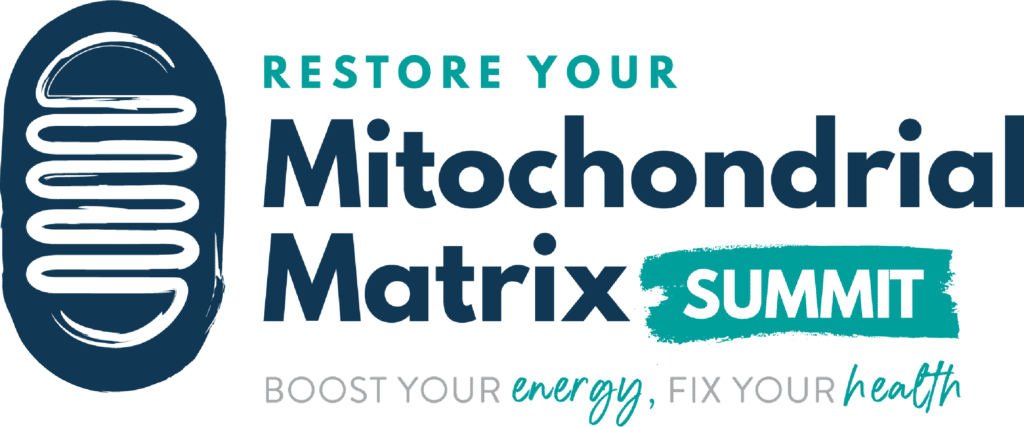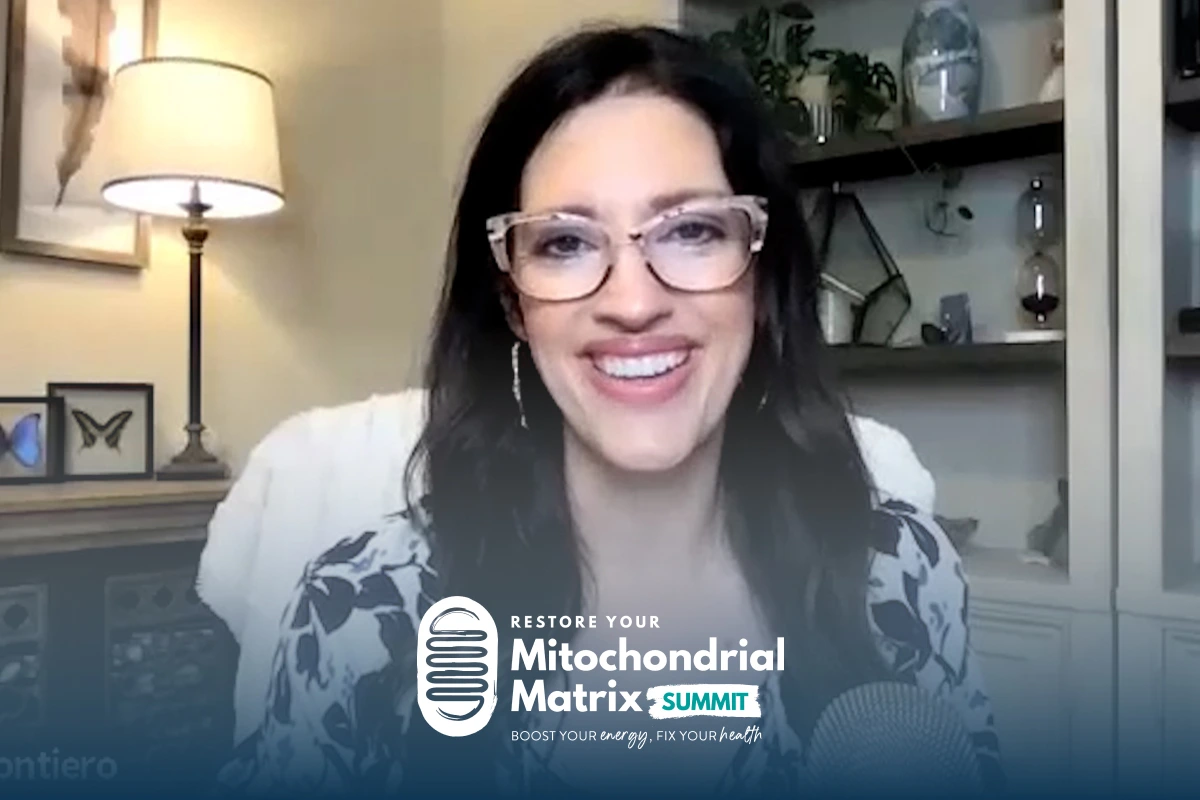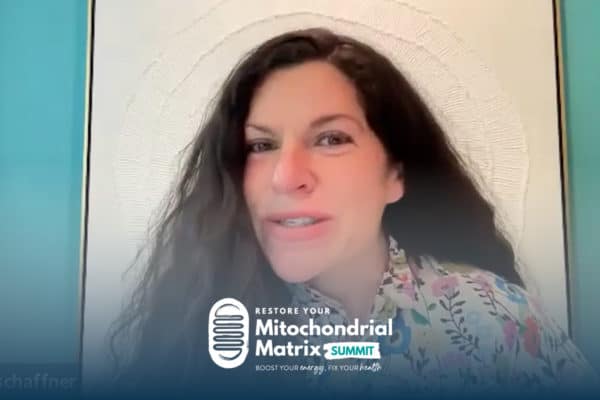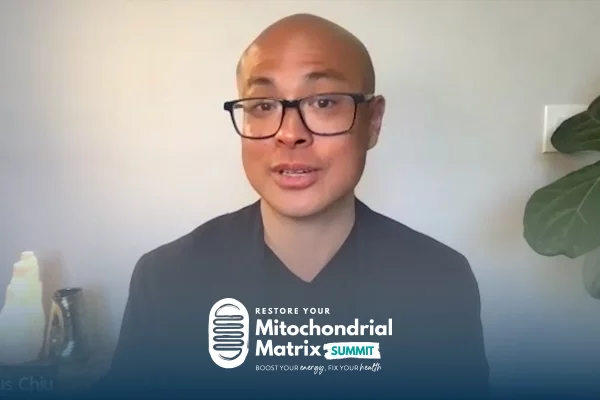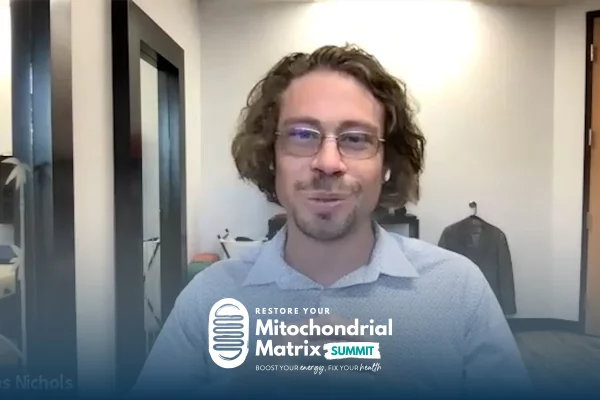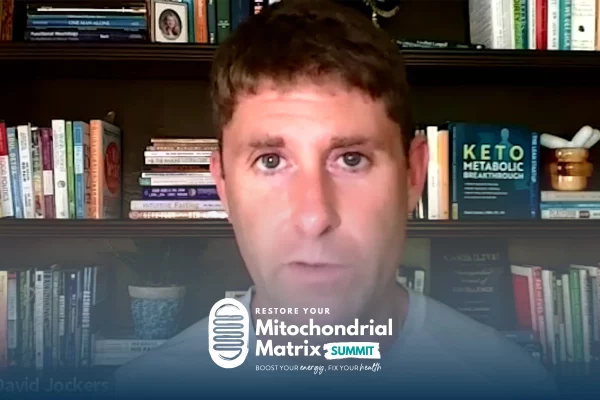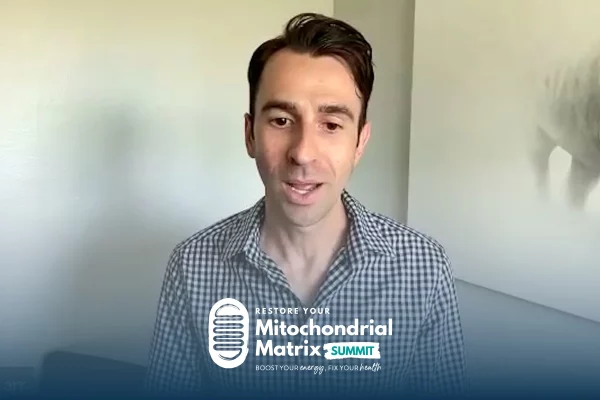Join the discussion below

Laura Frontiero, FNP-BC, has served thousands of patients as a Nurse Practitioner over the last 22 years. Her work in the health industry marries both traditional and functional medicine. Laura’s wellness programs help her high-performing clients boost energy, renew mental focus, feel great in their bodies, and be productive again.... Read More
- Understand current thinking about the concept of ‘adrenal fatigue’ and how it is actually a problem of mitochondrial dysfunction instead
- Explore what it means when we interpret adrenal test results, and why traditional adrenal protocols make you feel better when the real issue is mitochondrial decline
- Learn what is causing mitochondrial damage and how to permanently fix it.
Laura Frontiero, FNP-BC
Welcome back to the Mitochondria Conversation. I’m your host, Laura Frontiero, and in this talk, I’m going to be covering the truth about adrenal fatigue and debunking some myths for you. And I’m joined today by Daniela Giangiorgi. She’s my lead coach and right hand at Bio-Radiant Health. Hi, Daniela!
Daniela Giangiorgi
Hi, Laura. Hi, everyone!
Laura Frontiero, FNP-BC
I’m so glad to have you back. And to this audience, I wanna introduce you as well. You’re a mindset empowerment health coach who is also a Pilates instructor with a muscle activation technique certification. And everything we’re doing on this summit is so relevant to you because at age 41, you were diagnosed with breast cancer, so young, and this interrupted the breastfeeding of your one-year-old baby boy. And you had to do a lot of shifts in your health and in your life, and a lot of the things that we’re talking about on this summit are actually strategies and things that you’ve done in your own health so you understand this first-hand. You also help our clients with this, so thank you for being here. Welcome, and I’m so glad you’re here to facilitate this discussion on adrenal fatigue. This is gonna be a good one.
Daniela Giangiorgi
Yes, it is gonna be a good one. It really is always a pleasure. When something like this happens to you in your life, you learn from it. You really do, and one of the best ways to heal yourself is to give back, is to create lemonade out of lemons, and so that’s one of the reasons why I’m so passionate about this and I was healthy in general before that ever happened, and I’m even more passionate about my health and my mindset now, and so it’s incredible to be able to do this and I feel so fortunate to be working with you on all this. And you know, Laura, I’ve known you for several years at this point, but I also know that even before I knew you, for about 20 years now, you’ve been a nurse practitioner and now you are the founder and the CEO of Bio-Radiant Health, and you’ve worked amazing experts in the field. And one of the gifts you have is breaking down complex scientific information into really easily understood concepts, and I even like to say, “Laura is famous for her analogies.” They really hit home and people are very open and you don’t feel intimidated. You’re not intimidating. You’re incredibly generous about helping people understand what it is they need to learn.
And because of it, you’ve become this trusted resource for people who want to build back their health. These people, they need a go-to source for someone to help them restore their gut health, their energy, and their brain health. And one of the reasons I see your clients staying with you for so long is because you truly are able to help them connect the dots between all the various operating systems within their bodies and their lifestyle choices, and you’re allowing them to see the connection and how it’s affecting their bodies and how their symptoms are getting created. And once they understand this, their healing and their restoring process becomes so much more easier, they’re so much more committed, they’re so much more in the buy, and people take off. It’s incredible. So we’re talking about this adrenal fatigue and mitochondrial dysfunction, so can you break down the current thinking about the concept of adrenal fatigue and how it may actually be a problem of mitochondrial dysfunction and not necessarily adrenal fatigue?
Laura Frontiero, FNP-BC
Yes, and that is a crazy concept because, and I use air quotes, the term “adrenal fatigue” has widely been used in the naturopathic and functional medicine space for decades. And it’s also been widely contested by traditional endocrinology and the endocrinology society, and all the other medical specialties do not recognize this condition, stating that no scientific proof exists to support adrenal fatigue as a true medical condition. So that’s kinda what we’re up against in the functional world, is that big controversial thing where one arm of medicine says, “No, it’s not” and another arm of medicine says, “Yes, it is.” So this is a huge disconnect between conventional and complimentary medicine and it creates a lot of frustration because when your conventional medicine lab workup is normal, then what do we do? How can we explain fatigue? And that’s one of the reasons that adrenal fatigue came about, because it’s an explanation. And there is some truth in it, but there’s more to it. I’ll comment here that if you are tired, if you’re brain foggy, if you have lack of motivation, if you have fatigue, you should first have a thorough evaluation with a medical doctor because conditions and diseases like anemia, sleep apnea, autoimmune diseases, infections, mental illnesses, heart and lung problems, kidney and liver disease, they need to be ruled out because all of those things can cause those exact same symptoms. But when nothing else shows up and you get a clean bill of health, you’re gonna start looking for reasons not recognized by the allopathic medicine world.
And a theory for these symptoms is adrenal fatigue, and that links stress exposure, so chronic stress exposure and adrenal exhaustion, so those things are linked together with that term of adrenal fatigue. And that is linked together as a possibility or a cause for lack of energy. Now, a quick lesson on adrenals, which are two small glands that sit on the top of your kidneys, and they produce a whole bunch of hormones like cortisol, for example, which is what we look at with adrenal testing. And when you’re under stress, we produce and release short bursts of cortisol into the bloodstream, and that helps us have the energy to fight off whatever the stressor is because in the beginning of humanity, before we had our fast-paced modern world and sitting in cars in traffic and frustration with our kid’s teacher or watching the stock market go up and down, whatever’s causing us stress that burst of cortisol gave us energy to fight the stressor which was more like a wild animal chasing you or fighting for your food or fighting for your life or running from an avalanche. I don’t know, something like that. So the adrenal fatigue theory suggests that prolonged exposure to stress could drain the adrenals and leads to an inability, or not ability, to produce cortisol, and then ultimately, not being able to produce it results in a low-cortisol state. And the adrenal depletion would then cause brain fog, low energy, depressive mood, salt and sweet cravings, lightheadedness, other vague symptoms, that all goes along with adrenal fatigue. Now here’s the thing. Damaged mitochondria are also directly connected to the same symptoms, especially fatigue and brain fog, and mitochondria are also important as part of the adrenal function since they begin the process of making the hormones produced by the adrenals.
So there’s messages sent from the mitochondria to the adrenals saying, “Start making hormones.” So if that system isn’t working, then hormones aren’t going to be made in normal levels. And so a little deeper on the lesson here, the science lesson, in order to make hormones, first, cholesterol is converted, so this is the good reason for cholesterol. In my class, a week ago, one of the people in my class was asking, “Is there such a thing as too low a cholesterol?” “And what does cholesterol do anyway?” So yeah, there is such a thing as not enough cholesterol because if you don’t have enough, you can’t make hormones. First, cholesterol is converted into pregnenolone, which then creates a whole bunch of hormones like DHEA, estrogen, progesterone, testosterone, and cortisol, which is what we’re always looking at with adrenal fatigue. And I use air quotes because, I mean, it’s a thing, and there’s also more to the thing than adrenal fatigue is what I’m getting at. So logically, if your mitochondria aren’t functioning like they’re supposed to, then adrenal hormone production is lowered and can become imbalanced, and if this goes on too long, theoretically, you’ll move through different stages of adrenal fatigue. We think of adrenal fatigue like stage one, stage two, stage three which is that flatlined stage three, until you become so tired that you can’t function. So the big question becomes is it that your adrenals are broken? Or is it that your mitochondria can’t generate energy and send signals?
Daniela Giangiorgi
Wow, okay.
Laura Frontiero, FNP-BC
That was a lot.
Daniela Giangiorgi
So much, so much. Now let me repeat back what I’m hearing you say, that it sounds like there might be more to this concept of just as simple adrenal fatigue than we thought because so much of it may be due to this link to mitochondria health. Is that right?
Laura Frontiero, FNP-BC
Yes. And what we now understand the problem to be is that the signaling between your brain and your adrenal glands isn’t working efficiently any longer, plus your mitochondria are no longer generating energy like they should. This summit is full of speakers talking about energy production for mitochondria and how 90% of our bodies’ energy are produced by the mitochondria. So when you’re not producing it, you feel fatigue and brain foggy, and your measurable hormone levels get out of whack because your mitochondria aren’t sending signals to the adrenals to make the hormones like they should. So now let’s sink in the stress piece here because when we think of the concept of adrenal fatigue, it’s linked with high stress levels. You remember, adrenal fatigue, we think about people have high stress level, adrenals get outta control and eventually fizzle out and stop making cortisol. That’s the theory. But here’s the deal. When our bodies are under stress, it changes our mitochondria too and it makes them not function properly. So stress does more to us than just hurt our adrenals, so to speak. When your mitochondria are hurting, their size and shape changes. We call that morphology.
That’s the scientific term for this. Plus it can also change how our mitochondria generate antioxidant enzymes that actually help to protect the mitochondria. So when you have short-term stress, it’s manageable by your body. But if that acute stressor is longer than just a few minutes or a few hours, if it goes on for weeks, months, years, our mitochondria can start to become damaged and become dysfunctional. Lots of stress is harmful to our system and the mitochondria can’t keep up and our energy production drops, antioxidant production drops, which means our body can’t protect itself anymore, and so that’s when we really start to feel that exhaustion, overwhelm, moody, anxious, depressed. So let me go just a little bit deeper here. Mitochondria regulate almost all aspects of our stress response, so that means an increase in hormone production like cortisol is happening because the mitochondria said so, because the mitochondria sent off a signal to start the process. So they’re sending a signal from the brain to the adrenals, saying, “We’re in trouble.” “We are getting chased right now.” “Make cortisol, and let’s get the heck outta here.”
So when we’re under stress, there’s a bunch of other things that also happen in our body. Our blood flow patterns change, our blood pressure can go up, our heart rate increases, our breathing gets heavier, and then digestion and kidneys turn down because we don’t wanna be digesting food while we’re being chased. We don’t wanna be making urine while we’re being chased. And your mitochondria are responsible for signaling that whole entire thing. Everything is run by the mitochondria. So when we have chronic stress, the mitochondria get fatigued, the signaling goes haywire, and the systems that make all this happen don’t work efficiently any long, and when the mitochondria aren’t working and signaling properly, cortisol levels can actually go super high and we see this sometimes on adrenal testing. Before we see a blowout, we see that they’re high. And all these years, we’ve been blaming low energy and fatigue on cortisol and adrenal fatigue when really it’s mitochondria dysfunction.
Daniela Giangiorgi
Wow, okay. The regulation here is incredible.
Laura Frontiero, FNP-BC
It is.
Daniela Giangiorgi
Of mitochondria. It’s really the root. Okay, so let me ask you this. Can you talk about what’s really happening when you do, like we have clients that come to us and they want an adrenal test, what’s happening when you do an adrenal cortisol test on someone who shows up with super low levels of cortisol? We sometimes hear this called end-stage adrenal fatigue or flatlined adrenals. Is there more to it than that?
Laura Frontiero, FNP-BC
Yeah, so it’s not that they’re not making cortisol at all. It’s that they’re just not showing up on the functional test. They’re showing a low level on functional tests. So we’ve already established that our mitochondria become dysfunctional with chronic stressors. Chronic stressors, like I mentioned, you’re sitting in traffic. You’re watching the stock market. You’re fighting with your spouse. Your teenager’s acting out. Your neighbor’s dog keeps peeing on your lawn. I mean, who knows what’s going on. But they’re no longer able to generate the energy we need, the mitochondria, and they’re not able to create those antioxidant enzymes anymore, and we get more and more cell damage and more and more things break down, and communication signaling from the mitochondria to the adrenals stops working properly and then we can’t make enough cortisol anymore. So even if your body needs more cortisol, your mitochondria can’t send the signals to make it. And it’s not that your adrenal gland is incapable of producing it. It is capable of producing it, but it’s the signals that aren’t being sent to make it and that’s when you feel exhausted, overwhelmed, anxious, depressed, and brain foggy. And even something like going grocery shopping, unpacking groceries and getting dinner on the table feels exhausting and overwhelming because your body’s energy production systems are just not able to keep up with your body’s demands because it’s a signaling problem.
Daniela Giangiorgi
Okay, so messaging, signaling, and just regulation. Okay, can you now explain why traditional adrenal protocols, why are they still helping symptoms when at the root, it’s actually a mitochondria problem? A little devil’s advocate.
Laura Frontiero, FNP-BC
Right, so this is crazy. We write adrenal protocols for people based on cortisol and DHEA levels. We’re looking at what adrenals are doing and we’re giving a protocol, so if it’s a mitochondria problem, why does it help some people get better? Well, think of it this way. When somebody is presenting with what we classically call adrenal fatigue, they’re exhausted. They’re overwhelmed. They’re stressed out. They probably aren’t taking care of themselves. They’re not eating healthy. They’re not exercising. They’re not drinking enough water. They’re not practicing self care. They’re not sleeping well. And what do we do in an adrenal protocol? We start supporting the HPA, hypothalamus-pituitary-adrenal axis, which is a messaging system between your brain and your adrenals, and we support it with things like soothing adaptogenic herbs like ashwagandha and antioxidants like lipoic acid that also helps with blood sugar regulation. And then we make their protocol full of lifestyle things as well. We say, “Okay, supplements aren’t gonna get you there alone” “so we need you to be sleeping,” so we support and help them with a sleeping routine and a sleeping plan. And then we get them eating healthy things and exercising gently because when your mitochondria are flatlined, if you exercise hard, it’s gonna hurt you, so we have them exercising gently.
We have them hydrating and we might even give you some liquid pregnenolone. Remember when I explained how cholesterol, pregnenolone, hormones, that cascade? So we might give you some liquid pregnenolone which converts straight to cortisol, so if your cortisol levels are low and I give you that, it’s gonna give you a boost, and most people are gonna feel better right away as the system starts to reset itself, so this is a good place to get a quick win. An adrenal protocol gets you kinda off the floor or off the ceiling, whichever direction you are. If your cortisol levels are too high or if your cortisol levels are too low, it’s gonna give you a win because once you start feeling a little better, then you can do the deeper work. However, if you feel down and out again when you stop the adrenal protocol, then you know you have deeper mitochondria work to do like detoxing, gut health fixing, fixing nutrient deficiencies, all of those types of things. So yeah, adrenal protocols can make us feel a lot better. But if it’s a mitochondria decline at the root of it, it’s not gonna solve it long-term.
Daniela Giangiorgi
Yeah, ’cause it sounds like the adrenal protocols are just lots of healthy lifestyle protocols or habits which is obviously gonna support them, but I see what you’re saying. If things don’t really improve and sustain that way, that’s an indicator.
Laura Frontiero, FNP-BC
Yeah, and I’ll add one more thing, Daniela. When I run adrenal tests on people, it’s never done without other things at the same time. I’ve never just offered my audience, “Who wants an adrenal protocol?” I always do it along with other things like organic acids testing or gut testing, so I have a bigger picture of what’s happening. And what my clients don’t realize is always simultaneously, as I’m supporting them, I’m running a mitochondria protocol underneath what they’re doing.
Daniela Giangiorgi
Ninja-style.
Laura Frontiero, FNP-BC
Yes, it’s ninja-style. And so I’m supporting those mitochondria because what I just explained here, could you imagine if I explained that to every client? They’d be like, “Laura, I don’t need to know all that.” “Could you just help me feel better?” So I ninja-run the mitochondria protocol underneath what we’re doing, but if I’m running an adrenal protocol, I wanna know what’s happening with mitochondria because if your mitochondria are flatlined, if you’re in a hypometabolic state, if I give you an adrenal protocol, it’s not gonna help you. You have to fix those mitochondria as well. So I just wanted to add that.
Daniela Giangiorgi
Yeah, okay Laura. What I’m hearing is if someone’s done a basic adrenal reset protocol with the lifestyle changes and supplement support, it can be really helpful. But if you’re not getting the results and improving, as you said, then there’s probably that deeper mitochondria damage that needs to be repaired, right?
Laura Frontiero, FNP-BC
Mm hmm.
Daniela Giangiorgi
Okay. And then we need to get down to the root cause of the problem, which that’s all what you’re about, so can you tell us what is this root cause? What could be harming your mitochondria?
Laura Frontiero, FNP-BC
Yep, so there’s two things you don’t have control over and everything else you do when it comes to mitochondria harm. The first thing is aging. Every year, you’re a year older. We cannot stop that. We cannot stop time. And we do have decline in mitochondria populations as we age, though as you’re learning while you watch this summit, there’s a lot you can do to maintain high levels of mitochondria populations, no matter what age you are. But there’s no way that an 80-year-old is gonna have the same amount of mitochondria as a 25-year-old. It’s just not. So that piece you don’t have control over. The other piece you don’t have control over is your genetic predisposition, so you do not have control over the genetic predisposition you were born with. However, you do have control over whether those epigenetics are turned on or off, so how you express your genes. Your genetics are like a light switch that can be turned on or off with lifestyle, so if you’re doing things that harm your body, that genetic switch might be turned on that makes you all of a sudden, a genetic disease shows up that you never had before. That switch can stay off if you live a healthy lifestyle, in most cases, so you do have control over gene expression.
You just don’t have control over the predisposition you were born with. Okay, so then that leads to everything you do have control over. First and foremost is poor diet. Sugar, processed food, non-organic food containing pesticides, herbicides. It matters what you eat. And I could talk for a whole, I did talk for a whole entire talk about food. We did do a talk all about what to eat and when to eat, so go listen to that talk because I go deep into this. Nutrient deficiencies cause problems. Nutrient deficiencies can occur because of leaky gut. They can occur because of toxicity. They can occur because of eating disorders. There’s lots of reasons that nutrient deficiencies can happen, and because our food sources are depleted of nutrients as well. And then sedentary lifestyle. This is a problem. Mitochondria want you to move. They need you to move. There’s a lotta talks on this summit about mitohormesis and hormetic stress that’s good for you, and I did a talk on hormetic stress. RE Whitten did a talk on hormetic stress so go find those talks. But exercise actually is good stress for your mitochondria and so if you’re not exercising, then you’re not gonna have as healthy of mitochondria. Chronic stress, which we just talked a lot about, sleep deprivation, which is also a reason for mitochondria decline, and then infections. Think viral, like Epstein-Barr, hepatitis, herpes, or bacterial. We get bacteria infections in our gut microbiome. People have chronic urinary tract infections. We can get infections in our body that are smoldering and we don’t know they’re there.
And then fungal infections, so think of candida, and then parasite infections, which I love to talk about parasites. I haven’t had much of an opportunity to talk about parasites on this summit, but when you work with me in my gut programs, we talk a lot about parasites. They’re everywhere in the environment, even in first-world countries, and parasites also are not just in your gut but they can go everywhere in your body and there’s hundreds of species of parasites, so they cause mitochondria decline. And then environmental toxins, so everything from your cleaning and body and beauty products, and if you didn’t catch the interview I did with Daniela where we went through my kitchen and my bathroom and looked at all the products that I use and several that Daniela uses to keep ourselves and our families healthy. It’s lowering the environmental toxic load that’s so critical. And then things like radiation and electromagnetic fields, we’ve got talks about that on the summit so find those talks. Other things in the environment: heavy metals, mold and mycotoxins. We’ve got talks on mold and mycotoxins as well. And then all of this that I just explained, just that whole list of things, it leads to leaky gut and it leads to chronic inflammation, which both of those are leading factors in mitochondrial damage, so if you didn’t hear my talk on day one about leaky gut and the link between mitochondria and leaky gut, go listen to that because it’s very eye-opening and spells it all out for you. So Daniela, that’s the reason. That’s the root causes that we have that are underlying and hurting our mitochondria.
Daniela Giangiorgi
You talking about the two things that we don’t have control over, the genetics that we’re given, not the expression but the genetics that we’re given and the age, it makes me want to run and do all these protocols that you’re talking about because that sort of in the back door helps give you some sort of traction to maybe not exactly be able to completely control, but somewhat help shift things more, creating a safe environment for our bodies to have this expression, to turn off the genes that aren’t cooperative. And knowing that I can do something today to help my aging and lose less mitochondria as I age, I mean, game on! It’s exciting.
Laura Frontiero, FNP-BC
It is. And you’ve done a lot of these protocols.
Daniela Giangiorgi
I have.
Laura Frontiero, FNP-BC
But we’re still working’ through stuff, yeah.
Daniela Giangiorgi
Absolutely, and I always feel like there’s always more, there’s always more.
Laura Frontiero, FNP-BC
There is. So that’s the thing. We’re never done, right? So just when you think you’re done, something happens. I mean, I was in the peak of my health when I got COVID last August, and it took me out. It was wild. And who knows? It might have something to do with my genetics. It might have something to do with the strain of COVID I got, but there I went, just down and thank goodness I know how to build myself back up again, but it took a long time. It took a long time to get my brain back.
Daniela Giangiorgi
Yes, well and just think about how much harder and how much more it would’ve taken you down had you not.
Laura Frontiero, FNP-BC
I know.
Daniela Giangiorgi
I do think about that.
Laura Frontiero, FNP-BC
I know, so things happen though, right? We get exposed to toxins. We travel. We get exposed to things there. You might get a parasite infection. You might go on a trip and get a parasite infection and end up with leaky gut all over again, and oh my gosh, then we gotta go fix that again. It’s never done. There’s maintenance.
Daniela Giangiorgi
It’s never done. But I find this conversation and all these conversations incredible empowering because you know how to get back on the horse, because this is an educational empowered view where you know that you can manage things. You know what to go to. You know you can find a resource. You know you can educate. You know you can start taking this and you can support yourself. We don’t ever know what’s gonna happen and how and things are gonna come at us, but we can rest well and sleep soundly knowing that we have resources and the motivation and the commitment to move forward and support ourselves.
Laura Frontiero, FNP-BC
Absolutely.
Daniela Giangiorgi
Wonderful. So Laura, for this summit, I know you’ve created this amazing live 21-day journey coming up, and this is aimed to support our viewers to become energetic and focused so that they can match level of ambition that they have. So can you share a little bit more about this program and how to get access to it?
Laura Frontiero, FNP-BC
Yes, and I just gave you a long list of all the things wrong with your mitochondria potentially, and so this 21-day journey with me is going to be foundational in how we fix our mitochondrial damage. Now, there’s lots of talks all over this summit explaining how to fix mitochondria including all the many talks that I’ve done on this summit, but sometimes you need someone to help guide you and put it all together. So that’s what we’re gonna do in this 21-day program, is we’re gonna put it all together and we’re gonna guide you through it. Two live-group coaching calls per week so that’s six touchpoints with me as you implement the strategies that I teach during the course. And I’m gonna coach you on the steps to take so you can wake up every day feeling purposeful and energetic so you have focus when you’re working on important tasks, so your brain is working well, so you have the energy to keep up with your family, mentally, physically, so you can have weekends together and have fun and not have to have a recovery rest weekend.
And you’ll know what foods to eat and which to avoid so you can have maximum energy levels, and you’ll know what products to keep in your home that’ll help you in our long-term success, and you’re also gonna have a clear understanding of the sneaky things in your home that are zapping your energy. You’ll know what role sleep plays in your recovery process and I’ll help you build a personalized plan to get the amount of sleep you need. And you’ll also have a clear understanding of which supplements will support your energy and how long you should take them. That’s whether you live here or abroad, but if you live in the United States, I’ll also have optional curated supplement protocols to speed up the process for you, And I put together the best products on the market to give you fast results and simultaneously set the foundation for long-term healing for your inflammation and your leaky gut and chronic symptoms, and everything I do is with the purpose of permanent results, not temporary hacks.
We wanna get you feeling better. And so I encourage you to join me on the 21 days. You can go to easyenergyreset.com to learn more and get access. That’s easyenergyreset.com. And I always invite you as you’re going through this summit to find the people who can support you best. Find your practitioners. Find the people who have the solutions for your unique situation because that’s why we put these summits together. We brought together, there’s 70 speakers on this summit total between the live event and the bonus talks, and so get access to that and listen to all the resources here. Take the time for yourself to do it. Get permanent access to it so you can watch it over and over again and share it with your friends and family and loved ones too. So thank you, Daniela, for facilitating this talk about adrenal fatigue and the myths about it and what we always said it was but what it really is. I know, it’s crazy.
Daniela Giangiorgi
It’s so fascinating.
Laura Frontiero, FNP-BC
I know, it is fascinating, so thanks for being here.
Daniela Giangiorgi
Thank you.
Laura Frontiero, FNP-BC
All right, everybody, take good care! Bye now!
Downloads
